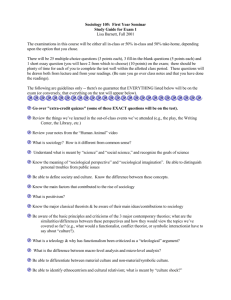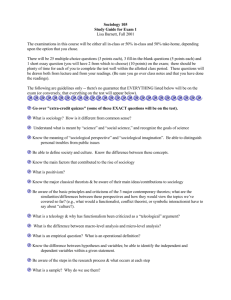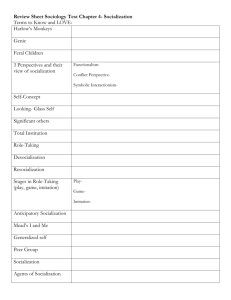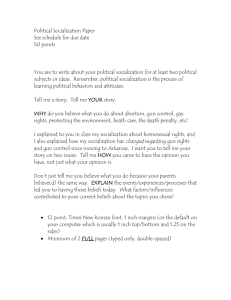Winter 2012
advertisement
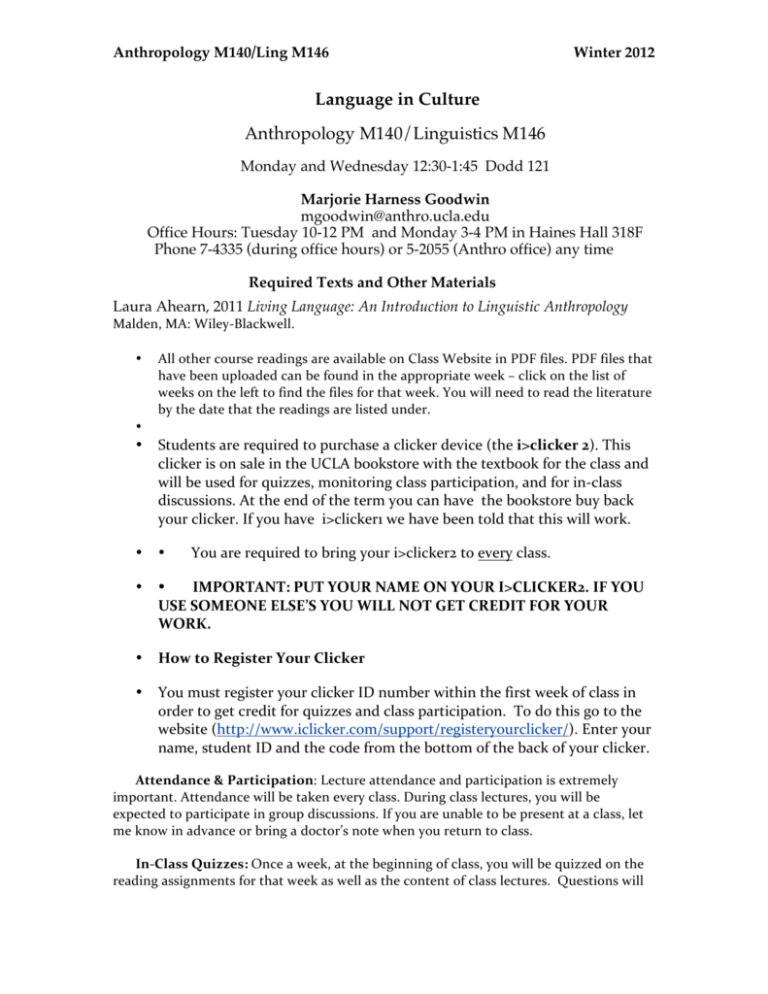
Anthropology M140/Ling M146 Winter 2012 Language in Culture Anthropology M140/Linguistics M146 Monday and Wednesday 12:30-1:45 Dodd 121 Marjorie Harness Goodwin mgoodwin@anthro.ucla.edu Office Hours: Tuesday 10-12 PM and Monday 3-4 PM in Haines Hall 318F Phone 7-4335 (during office hours) or 5-2055 (Anthro office) any time Required Texts and Other Materials Laura Ahearn, 2011 Living Language: An Introduction to Linguistic Anthropology Malden, MA: Wiley-­‐Blackwell. • All other course readings are available on Class Website in PDF files. PDF files that have been uploaded can be found in the appropriate week – click on the list of weeks on the left to find the files for that week. You will need to read the literature by the date that the readings are listed under. • • Students are required to purchase a clicker device (the i>clicker 2). This clicker is on sale in the UCLA bookstore with the textbook for the class and will be used for quizzes, monitoring class participation, and for in-­‐class discussions. At the end of the term you can have the bookstore buy back your clicker. If you have i>clicker1 we have been told that this will work. • • • • IMPORTANT: PUT YOUR NAME ON YOUR I>CLICKER2. IF YOU USE SOMEONE ELSE’S YOU WILL NOT GET CREDIT FOR YOUR WORK. • How to Register Your Clicker • You must register your clicker ID number within the first week of class in order to get credit for quizzes and class participation. To do this go to the website (http://www.iclicker.com/support/registeryourclicker/). Enter your name, student ID and the code from the bottom of the back of your clicker. You are required to bring your i>clicker2 to every class. Attendance & Participation: Lecture attendance and participation is extremely important. Attendance will be taken every class. During class lectures, you will be expected to participate in group discussions. If you are unable to be present at a class, let me know in advance or bring a doctor’s note when you return to class. In-­‐Class Quizzes: Once a week, at the beginning of class, you will be quizzed on the reading assignments for that week as well as the content of class lectures. Questions will Language in Culture Winter 2012 be multiple choice, and registered through the i>clicker2. It is very important to show up to class in time; otherwise you will miss the quiz. There are no make-­‐ups for quizzes. Midterm Examination: There will be a midterm examination covering the readings, lectures, and other course materials through week 5. There will be no make-­‐up midterm examination. Final Examination: There will be a final examination covering the readings, lectures, and other course materials from weeks 6-­‐10. There will be no make-­‐up final examination. Students are encouraged to review the UCLA Student Conduct Code and the official statements regarding cheating and plagiarism at http://www.registrar.ucla.edu/soc/notices.htm and http://www.deanofstudents.ucla.edu/assets/documents/StudentCC.pdf. In short, just don’t do it! Reading Assignments (on Class Website) Week 1 M Jan. 9 The Socially Charged Life of Language W Jan. 11 Sign Use in Communication Web: Kenneally: The First Word: ch 6-7 Ahearn: ch. 1 M Jan. 16 The Research Process in Linguistic Anthropology (No Class: Martin Luther King Day) Ahearn: ch. 2 W Jan. 18 Language Acquisition and Socialization Ahearn: ch. 3 Web: Kenneally: ch. 1 The First Word Web: Ochs and Schieffelin: The Impact of Language Socialization on Grammatical Development Web: Burdelski: Socializing Politeness Routines (Japan) Video: Parts of The Human Language and Genie **Fieldnotes about Language Socialization Project due by 11 PM to TA Section Website: Use SPEAKING guide p. 10 of syllabus Jan. 23 Socialization through Language and Multimodality Web: Tulbert and Goodwin: Choreographies of Attention Web: C. Goodwin: Professional Vision Guest Speaker: Rachel Flamenbaum Week 2 Week 3 M 2 Language in Culture W Jan. 25 Winter 2012 American Sign Language and the Deaf Web: Lane, et al. The Language of the Deaf World Web: LeMaster and Monaghan, Variation in Sign Languages Guest Speaker: Dan Levitt, Office for Students with Disabilities **Outline of Language Socialization Project due by 11:00 PM to TA Section Website. One per group. Week 4 M Jan. 30 Language, Thought, and Culture Ahearn: ch. 4 Web: Cohn: Sex and Death in the Rational World of Defense Intellectuals Web: Santa Ana: ‘Like an Animal I was Treated’: AntiImmigrant Metaphor in US Public Discourse Feb. 1 Ethnography of Communication Web: Bonvillain: Outline of an Ethnography of Communication Web: Basso: To Give Up on Words Web: Basso: Stalking with Stories Guest Speaker: Lila Steinberg, Applied Linguistics on Participatory Democracy in Occupy LA M Feb. 6 Conversation Analysis Web: Schegloff and Sacks: Opening Up Closings Web: Silverman: Conversation Analysis W Feb. 8 Midterm Exam: No Make-Ups! No blue books needed M Feb. 13 Participation Web: Goffman, Footing Web: M. Goodwin: Processes of Dispute Management among Black Children Web: C. Goodwin: A Competent Speaker Who Can’t Speak W Feb. 15 Gender and Language: Alternative Models Ahearn: ch. 9 Web: Goodwin: The Hidden Life of Girls, ch. 1 W Week 5 Week 6 3 Language in Culture Winter 2012 Web: Cameron: The Myth of Mars and Venus Video: He Said She Said narrated by Tannen Guest Speaker: Dr. Heather Loyd, Neapolitan Girls: Growing Up Fast in Naples, Italy *Language Socialization Transcription due to TA Section Website by 11 PM Week 7 M Feb. 20 Literacy Practices (No class: Presidents’ Day) Ahearn: ch. 7 Web: Graham and Schieffelin: Enquoting Voices: Accomplishing Talk: Uses of B + Like in Instant Messaging W Feb. 22 Gender and Communities of Practice Ahearn: Ch. 5 Web: Bucholtz: Why Be Normal?: Language and Identity Practices in a Community of Nerd Girls Web: Goodwin: Exclusion in Girls’ Peer Groups Feb. 27 Performance, Performativity, and Communities Ahearn: ch. 8 Web: Barret: Indexing Polyphonous Identity in the Speech of African American Drag Queens Web: Kiesling: Dude Week 8 M Video: Paris Is Burning, Bombay Eunuchs (excerpts) Guest Speaker: Jeremy Kelly: The Practice of Referencing in U.S. Gay Men's Interactions W Feb. 29 Multilingualism and Globalization Ahearn: ch. 6 Web: Zentella: Multiple Codes, Multiple Identities Web: Urciouli: The Political Topography of Spanish and English Web: Jackson: Language Identity of the Colombian Vaupés Indians (strongly recommended) Video: Pidgin: the Voice of Hawai’i Week 9 M Mar 5 Language, Race, and Ethnicity Ahearn: ch. 10 Web: Rickford: Suite for Ebony and Phonics Web: Bailey: Shifting Negotiations of Identity in a Dominican American Community Web: Shankar: Speaking Like a Model Minority 4 Language in Culture Winter 2012 Video: Do You Speak American? American Tongues W Mar. 7 Language and Institutions Web: Mehan: The Construction of an LD Student: A Case Study in the Politics of Representation. Web: Thetela: Discourse, Culture and the Law Guest Speaker: Dr. Jeffrey Good: Language in Medical Interactions Language Socialization Project Due by 11:00 PM to TA section website Week 10 M Mar 12 Language Ideology, Language Death, and Revitalization Ahearn: ch. 11 Web: Mikihara: Languistic Purism in Rapa Nui Political Discourse Web: Kroskrity: Language Renewal as Sites of Language Ideological Struggle Guest Speaker: Jan David Hauck Video: Voices of the World: The Extinction of Language and Linguistic Diversity W Mar 14 Language, Power, and Agency Ahearn: ch. 12 Web: Blommaert: Language, Asylum and the National Order Web: Ehrlich: chapter 2 from Representing Rape Guest Speaker: Rachel Flamenbaum Exams and Projects There will be 2 exams given covering the materials read and lectures and a final project, which could be done in groups of 3-4. There are no make-up exams except in case of medical emergencies. Call the main office: 825-2055. Exams are clearly marked on the syllabus. Unfortunately many professors may schedule tests on the same date. For this reason it is to your advantage to keep up with the readings every day. The test questions will be based on the lectures, films and videos, readings that are on the web. If you keep up with the reading you will be well prepared for the tests. Late work will receive reduced credit. Do not email me or the TA’s about questions on the exam within 24 hrs. of exam. Language Socialization Paper or Powerpoint Presentation Language Socialization Assignment: People are socialized into various types of communities through language. With a group of 3-4 students the first week of class (as time is fleeting in a 10 week term) elect a field site where you wish to 5 Language in Culture Winter 2012 investigate how language is used to socialize people into a local community of practice (see Ahearn chapter 5 and Bucholtz (“Why Be Normal?”). The site you select for your fieldwork could be any type of class, including religious classes (Sunday school) or training, heritage language school, preschool, slack lining group, tutoring, weight training, massage, yoga, ballet, flamenco, karate, choir, drama club or theater group, kayaking, sailing, tea ceremony, Go (Chinese strategy board game), cooking class, debate team, horseback riding, rock climbing, child birth classes, La Leche classes, doula or midwife training, Mommy and Me classes; work site, including a school newspaper, store, hospital, legal office, or any business (car repair), or voluntary association, such as the Venice Family Clinic; social group such as a sorority, fraternity, cooperative, ethnic heritage club, family, religious group, Scouts, little league, soccer team; activist project (such as learning how to participate in a protest group such as Occupy LA) or learning language, deference, and demeanor in the context of the family. (The project could look at how parents and children socialize one another or siblings socialize each other.) Your group can present your findings either in a Powerpoint presentation during section or write a paper (8 - 10 pages of analysis in the main text; provide transcripts as well integrated into your project). Examples of projects are on the website under “Class Projects.” (1) Describe some of the important linguistic practices, competencies and vocabulary one must acquire to become a member in good standing of the local community (building on articles and lectures on language socialization). If metaphor is used in the process of instruction, describe the metaphors that are used by the instructor or expert guiding the novice to become a competent member. You may want to show how relations of gender, power, or ethnicity are negotiated in this setting; if appropriate discuss who has access to what spaces, objects, and interactional moves. Who uses what codes or registers? Make use of the article “Professional Vision” to show how material artifacts, coding, and highlighting are important. (2) Use the article by Schegloff and Sacks on conversational structure (“Opening Up Closings”), the article by Silverman on conversation analysis as points of departure for describing some specific conversational practices, i.e., assessments, stories, directives. Make a one page transcript of an exchange in your setting to illustrate how language is used for particular interactive purposes. A transcription guide is posted on the Website for the class (Transcription Conventions) under the heading “Project Preparation Readings”. See also the chapters Ethnographic Methods and Transcription: From Writing to Digitized Images under Project Preparation Readings. Provide translation if you are working in a language other than English. (3) Provide at least three references from readings or elsewhere in your paper or project presentation. Use the AAA style sheet under “Class Projects” on the web. Be consistent in how you make your references. Follow the citation conventions listed under the AAA style sheet. 6 Language in Culture Winter 2012 (4) The amount of time spent at the site you are researching will vary for each project. For your project you should visit your site enough to know that the interaction you are interested in is recurrent. This might mean 2-3 visits at the site. The more familiar you are with the site you are researching, the better. How much you record is variable as well. If you record an hour, you will very likely have some interesting interactions to look at. However, you will only need to select a few short representative segments relating to the main points you want to make to transcribe. (5) Go to the www.oprs.ucla.edu and look at information on consent forms. Undergraduate students are not required to have participants sign consent forms (unless you plan to publish your findings), but you need to be aware of what working procedures are. I have a letter I can give to you describing the nature of the class and I can describe your specific project. We are not investigative reporters; rather we are anthropologists who inform people of their rights NOT to have their conversations recorded. (6) Specific instructions about structuring your paper will be provided on Section Website. Please use a coherent style throughout. It is obvious if different authors provide separate parts of the paper in a style that seems pasted together hastily. An introduction should outline your project. Subsequent paragraphs should develop the main themes of the paper. Milestone Dates for Language Socialization Project Final Project Due: Thursday March 7 to TA website. People doing powerpoint presentations should present them in section (15 minute presentation). Turn in a CD of the project (to a Dropbox). Previous student papers are available on line. I. Fieldnotes by Each Student about Language Socialization Project due January 18 by 11 PM to TA Section Website: Use SPEAKING guide p. 9 of syllabus to generate some ideas for phenomena to attend to. About 300 words II. Outline of Language Socialization Project Description Due Jan 25 by 11:00 PM to TA Website. This is one project description per group. Put name, section, group members and project title. 1. In a paragraph describe the site where you are doing research and what you are focusing upon. Ask permission of those at the site to do 2. Describe what kinds of speech activities you will be looking at. 3. Then specify as much in detail as you can some of the following ways in which the activity is instructed: 7 Language in Culture Winter 2012 What types of routine sequences for teaching are used? (You might consider how directives, assessments, address terms, greetings, forms of dispute used?) What competencies are developed? What types of special vocabulary are used? How are metaphors used? What types of material artifacts are employed? In what ways are embodied actions important? How are highlighting, coding, or other practices involved in teaching a form of “Professional Vision” made use of? In what ways is gender, power or hierarchy made relevant? Does code switching occur; are special speech registers used? How is participation organized? See Section Instructions for more details. III *Language Socialization Transcription due Feb. 15 to TA Section Website by 11 PM. Put audio file in Drop box. Provide a transcript of some of the interaction you are looking at. All projects should involve audio or videotaping of naturally occurring interaction. You can use the “Transcription Conventions” provided under “Project Preparation Readings” on the class website. Schegloff’s Transcription Module is on his website at http://www.sscnet.ucla.edu/soc/faculty/schegloff/. The module is designed to provide practice in transcribing talk-in-interaction. All students will be asked to fill in an evaluation of how group members participated in the project. This evaluation form and a more elaborated project description with instructions are posted on the class website under Class Projects. Slackers will receive reduced credit. Oral Work Students will be responsible for reading assignments each class period. Class and section participation is important! Students should be prepared to discuss the readings each class session. Your class work is enhanced by conscientious attendance and active participation in class discussion and hurt by visible lack of preparation for class and section discussion (for example inability to answer questions about the readings) and failure to submit assignments on the dates and by the times specified in the class and section syllabuses. Exams are based on what is covered in class as well as the reading. Videos, many of which are not available elsewhere, will only be shown in class once, so if you miss the class, get notes. Policy: Do not arrive late or leave early. Make appointments for times other than the class time. Extra Readings of Interest are posted on the Web. 8 Language in Culture Winter 2012 Classroom Ethos Attending and teaching university courses are incredible privileges, and I want all of us to be able to take advantage of these privileges. To do so, I work to maintain an ethos in which we are all focused on the scholarly material, respectful of each other’s opinions and outlooks, and comfortable asking questions and making comments. You may not engage in any non-scholarly activities in the classroom, including reading the newspaper, doing a crossword puzzle, texting, talking on the phone, surfing the internet, or the more “oldschool” passing of notes. You also may not do coursework from another class. You must turn off your cell phone or set it to vibrate before class begins. If you use your laptop to take notes, you may not surf the web or have any windows open other than a note-taking window. Students who violate this policy will not be allowed to use their laptop. Lastly, if you must leave class early for any reason, please let me know before class begins and sit near an exit so as to minimize the disturbance. Grading Here is a rough breakdown on how your grade will be determined: Class and section attendance and participation 15% Midterm 25% In-class Quizzes 10% Final 25% Language Socialization Paper 25% Grading scale: 100-98 (A +), 97-92 (A), 91-90 (A-), 89-88 (B+), 87-82 (B), 81-80 (B-), 79-78 (C+), 77-72 (C), 71-70 (C-), 69-68 (D+), 67-62 (D), 61-60 (D-), below 60 (F) The Final Exam is in class March 21 8:00 AM -11AM. It will cover readings from the second part of the course and is not cumulative. Hymes' SPEAKING diagram (a guide) Speaking:. situation, setting and scene; physical circumstances of the communicative event, including time and place Scene: psychological setting; kind of speech event according to cultural definitions Participants; addresser and audience; could be addresser head of state whose message is read to reported by press agent Ends: outcomes, goals , purposes of participants (wanting to sell something) 9 Language in Culture Winter 2012 Act sequence: message form and content; must know how to formulate speech events in ways that culture values: indirect and direct quotations Key: manner or spirit in which speech act carried out: mock or serious, perfunctory or painstaking; sarcasm Instrumentalities: channels and forms: way message travels; smoke signals, telegraph, drumming Norms: of interaction and interpretation; Americans do no gap, no overlap norm of conversational turn taking Genres: poems, myths, proverbs, lectures, commercial messages, stories (like speech event, sermons 10

